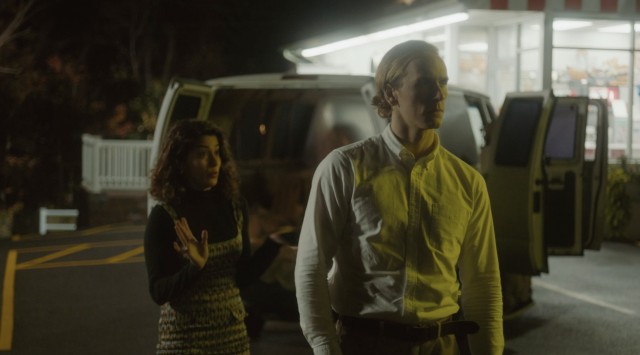While horror films are best known for their ability to strike fear in their audience, the genre often excels when addressing contemporary societal issues. From Ridley Scott’s confrontation of sexual assault in his revered film Alien, to Jordan Peele’s commentary on systemic racism in his debut feature Get Out, these examples demonstrate that horror narratives possess depth beyond mere scares. Chelsea Lupkin’s 12-minute short film Scooter serves as another example of this trend, as the identity of its true monster remains ambiguous, emphasising the genre’s capacity for nuanced storytelling over simple jumps.
“The genre leaves room to write about something bigger”
Opening with a scene of a man (obviously a dick!) belittling his girlfriend, Adrienne, after a night at the house of his boss, it isn’t immediately obvious from the exposition of Scooter that Lupkin’s film (disclosure: Chelsea is a writer/curator on the Short of the Week team, as well as a talented emerging filmmaker) is a horror at all. However, as the protagonist, expertly portrayed by Awni Abdi-Bahri, is left stranded by her boyfriend and ends up in the parking lot of a fast food restaurant, the narrative intensifies with the unsettling discovery of a girl trapped in a van.
Using the basis of this story to “write about something bigger”, Scooter is over seven-minutes old when the film finally unleashes its “demon”. With Lupkin describing both her central characters as “imprisoned and vilified”, it’s up to the viewers to decide where the true monster lies – is it the blood-thirsty creature we never really see, or is it those operating in clear sight. A story of patriarchy and power, Scooter allowed its writer/director the chance to tell this particular allegory, while also having “a little fun with fake blood” and it delivers on both fronts.

When Adrienne encounters a van full of men with something unexpected in the back, the film ramps up on the energy and action
With the narrative’s metaphorical layer adding essential depth to the storytelling and making it stand out, it falls upon the production team to translate this narrative to the screen with nuance and impact. Similar to the storyline’s duality, Lupkin and her crew exhibit two facets of their talents throughout production. Initially, the short adopts a slower, character-driven approach, allowing its audience to bond with the film’s protagonist, while gradually building tension. However, as the demon is unleashed, the pace escalates into full-on blood and guts action, showcasing the crew’s versatility and skill.
In those early scenes, where dialogue is key, Jonny Kapps‘ cinematograhpy and Stephania Dulowski’s editing exercise great restraint, providing ample space for the performances to take centre stage. However, as the action unfolds, they adeptly increase the pace, utilising quicker cuts and more dynamic camerawork with great effectiveness. Lupkin also couldn’t resist the opportunity to use Scooter to “test out stunts for the first time”, revealing that as she enters the world of feature filmmaking in horror, “knowing how to use crash pads and pulleys and working with an actual stunt coordinator was a big deal”.
And it’s that feature work that Lupkin is focusing on now, with an untitled horror film she is working on with her long-time creative partner Sarah Kalagvano in collaboration with Crooked Letter, set for a spring production. We’ll make sure Chelsea provides all the juicy updates on that production when it begins.

 Rob Munday
Rob Munday